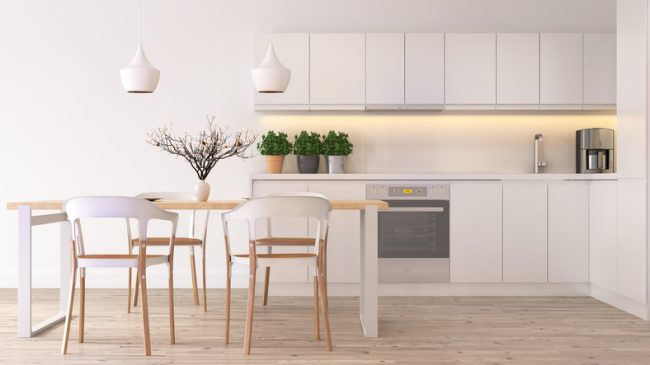Do you remember the first material thing you ever longed for? Was it your first bike? A piece of clothing? Perhaps a collectible toy, or even the soundtrack to your favorite film? How did you come to discover what ever “it” was—and know that you had to have this object of your affection? Were other kids in the neighborhood touting this awesome thing? Or was it advertised to you, directly, through commercial means? Did you need said item, or did you simply want it to be like your schoolmates or friends down the block?
Minimalism for the masses
In the 2016 documentary, Minimalism: A Documentary About the Important Things, two of the foremost authors and speakers on the minimalism movement and founders of the website theminimalists.com, Joshua Fields Millburn and Ryan Nicodemus, seek to pull back the curtains on the nature of our compulsory consumption habits and examine the perceived well-being (or, lack thereof) we glean through the process of hunting down and/or acquiring “things” of all stripes, shapes and sizes.
The film contrasts the unfortunate byproducts of accumulating these possessions over the course of our lives (see: clutter, stress, unhappiness, massive environmental impact, etc.), and asks us to merely consider a life with less. Not less happiness, joy or contentment, but a life that, according to them, prioritizes those things ahead of the perceived satisfaction of acquiring the next great material thing.
The film is careful not to rail against those who consume, nor consumption in general, save for the vignette on the unsustainable nature of “fast fashion”. With a cast of experts from a variety of related fields, it seeks to make the viewer aware that there are other more meaningful, deliberate things we could be doing, rather than the repetitive action of wastefully collecting more stuff. And, of course, dealing with the resulting aftermath of having it swirl around and pour out of every square foot of our living spaces (and storage units).
The bare necessities
Proponents of the movement attest that by putting into practicum some of minimalism’s chief tenets, e.g., decluttering, simplifying and living with less, we can not only feel happier—but less stressed, more organized and productive in our day-to-day lives. This is not a lifestyle choice for everyone. It certainly won’t speak to many. And even those who do connect with its basic principles, it may be hard-pressed to act on the concept of adopting a minimalist lifestyle.
Ponder this…
The following are but a few sample, off-the-top questions when considering if the minimalist lifestyle might be for you. If you’re thinking about making the leap to a leaner existence, read on for a few of the basics and challenges of getting started with minimalism.
- Could you live with less space—much less—not out of necessity, per se, but by choice?
- Do you get the recurrent thought that getting rid of some things around the house or apartment might make you feel lighter (metaphorically speaking)?
- Does the relentless pursuit of career success and its trappings leave you feeling perpetually discontented, unfulfilled and wanting more from life?
- Does the premise of a living a more deliberate, meaningful life with less environmental impact appeal to you on an emotional level?
- Do you, or are you beginning to, prioritize life experiences over material goods?
- Have any of these things occurred to you before ever reading a lick about the term minimalism?
Decluttering: Start small, but start today
If you’ve been feeling overwhelmed by what you own, it’s a sure sign that you may want to start carefully paring down some of your superfluous belongings. Analyzing the totality of your stuff and exactly what you may want to get rid of is, understandably, a difficult first step for many.
Experts like Joshua Becker offer some creative tips for decluttering that may empower you in your quest and help to avoid engaging in the analysis paralysis many of us employ as a diversion tactic when seeking to make an important decision.
This goes for your digital life, as well. Take some time to clean up your desktop, delete old emails and trash unnecessary files. You’ll feel far less encumbered and distracted when traveling around your machine.
Whittling down your wardrobe
How many times have you or someone close to you uttered something along the lines of, “…I’ve got nothing to wear…”? Yet, we seemingly have clothing spilling out of every conceivable drawer, closet and storage bin. That refrain is not literal, of course, but more so a testament to the fact that we’re not “on-trend,” the right garments are not easily sourced among the chaos of too much choice, or consumption habits have led us astray— without a functional, balanced wardrobe.
With that in mind, sites like Project333 and cladwell.com are coming to the fore to help create pared-down, highly edited wardrobes of essentials, or “capsules,” in hopes of helping you minimize the motif madness and beat the unsustainable nature of fast fashion, simultaneously.
Simplifying your morning routine
Another key to the minimalist movement is related to “disconnecting” to a degree, from our digital lives. As such, experts recommend beginning each day with something that’s spiritual in nature, be it meditating, stretching, going for a walk or writing. Implementing one of these healthy habits, instead of starting the day by diving headlong into your social media feeds or email will, no doubt, spare you the adrenaline spike of quickly moving from the off to on position.
Also, remember to drink water right after you wake up, prior to consuming your morning brew.
By carving out a healthy, consistent morning ritual, you’ll be taking charge of your day and well on your way to becoming your best self, should you decide to follow in the path of the many successful minimalists before you.

